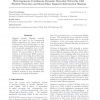Free Online Productivity Tools
i2Speak
i2Symbol
i2OCR
iTex2Img
iWeb2Print
iWeb2Shot
i2Type
iPdf2Split
iPdf2Merge
i2Bopomofo
i2Arabic
i2Style
i2Image
i2PDF
iLatex2Rtf
Sci2ools
120
click to vote
ICML
2010
IEEE
2010
IEEE
Heterogeneous Continuous Dynamic Bayesian Networks with Flexible Structure and Inter-Time Segment Information Sharing
Classical dynamic Bayesian networks (DBNs) are based on the homogeneous Markov assumption and cannot deal with heterogeneity and non-stationarity in temporal processes. Various approaches to relax the homogeneity assumption have recently been proposed. The present paper aims to improve the shortcomings of three recent versions of heterogeneous DBNs along the following lines: (i) avoiding the need for data discretization, (ii) increasing the flexibility over a time-invariant network structure, (iii) avoiding over-flexibility and overfitting by introducing a regularization scheme based in inter-time segment information sharing. The improved method is evaluated on synthetic data and compared with alternative published methods on gene expression time series from Drosophila melanogaster.
Dynamic Bayesian Networks | Homogeneity Assumption | Homogeneous Markov Assumption | ICML 2010 | Machine Learning |
| Added | 26 Jan 2011 |
| Updated | 26 Jan 2011 |
| Type | Journal |
| Year | 2010 |
| Where | ICML |
| Authors | Frank Dondelinger, Sophie Lebre, Dirk Husmeier |
Comments (0)

